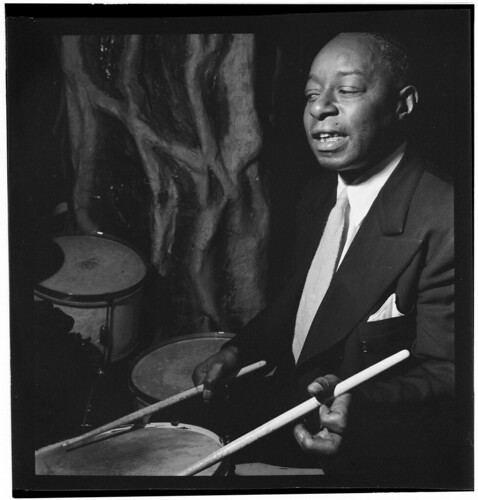Like most people, I can't say he's been a giant influence- I dug up some records when I was in school, and was struck by his fat, swinging sound, but that's about it. Unless you're playing Dixieland, it's not easy to apply his thing real directly- when playing modern music in the 60's tradition, you generally try to avoid those early stylistic things. Ed Blackwell and Charles Moffett come to mind as people who maybe do a similar thing in a hip way. Maybe I hear a little bit of him in Tony Oxley as well.
I take him as a reminder of the soul of the instrument that got maybe a little bit obscured as it moved into its modern phase- the "drumistic" rudimental melodies, military effects, the little two and three pitch melodies, sound/exotic effects, chokes, the strong use of the bass drum, the dramatic orchestration. Without the historical knowledge, modern drumming can sometimes feel like attempting high-level Christopher Guest style comedy without knowing anything about slapstick.
Here's a track from his famous Talking and Drum Solos record:
An interview excerpt and more clips after the break:
Via chipstern.com, this quote from a 1953 Dodds interview with Bill Russell is good:
I feel that I’m the key man in that band, and it’s up to me to make all them feel like playin’. Even if it’s no more than joking with ‘em. You can joke along with a band, and you have somebody with a grin on their face, and still they’re blowin’. And you can pass the word along, that somebody’ll feel good—well, that’s all up to spirit. I’ll say, just like a pitcher and a catcher. Now you would wonder, why do a catcher go out to the pitcher and talk to him on the mound, and the pitcher never comes in and talks to the catcher? Because the catcher has got this pitcher in mind, to know exactly what to do, and for him to not to get excited. Well, that’s like my job. In drummin’, you have got to pay attention to each and every one, and you must hear that person distinctly, and hear what he wants—you gotta give it to him. If he don’t like that, if he don’t go with it, give him somethin’ else. And that way you keep your band smooth. You have to keep your band jumpin’ and keep everybody lively.It's notable that he's talking about keeping the band rather than the audience engaged, as may be a little more the case with someone like Gene Krupa. Also about process rather than posterity, so to speak- he's talking about facilitating the performance rather than doing the perfect thing in a strictly musical sense.
This piece by Rick Mattingly is also good to read. He credits Dodds with the direct precursor of the jazz ride pattern, which was created by Papa Jo Jones and finally Kenny Clarke:
Dodds’ way of playing press rolls ultimately evolved into the standard jazz ride-cymbal pattern. Whereas many drummers would play very short press rolls on the backbeats, Dodds would start his rolls on the backbeats but extend each one to the following beat, providing a smoother time flow.
More clips:


2 comments:
Hey Todd, about ten years ago I transcribed and performed 6 Baby Dodds solos for the chamber dance company at the university of Washington. I can send them your way if you're interested.
I think of Dodds' lineage as being very apparent in the swing era, particularly in guys like Gene Krupa. Krupa's 'jungle drumming" style is, in my opinion, a direct extension of Dodds, as is his feel and phrasing. Krupa is obviously a direct influence on many drummers of his era, so the line goes on.
Emailing you now... must have transcriptions....
Post a Comment